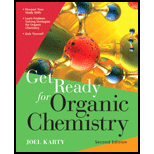
(a)
Interpretation:
It is to be determined how the given compound can be produced from an alkene.
Concept introduction:
An electrophile is an electron deficient species that is attacked by a nucleophile, which is an electron-rich species.
(b)
Interpretation:
It is to be determined how the given compound can be produced from an alkene
Concept introduction:
An electrophile is an electron deficient species that is attacked by a nucleophile, which is an electron-rich species. Alkenes can undergo acid-catalyzed hydration reactions in which the alkenes are treated with water in the presence of strong acids. The major product for these reactions is an alcohol. Water adds across the double bonded carbon atoms according to Markovnikov’s rule. The addition of water to an alkene favors the product in which the proton adds to the alkene carbon that is initially bonded to a greater number of hydrogen atoms (to the least substituted carbon atom), thus forming the stable carbocation intermediate. The rearrangement of the carbocation intermediate does not occur in this reaction. Finally, a proton transfer reaction must take place to form an uncharged product.
(c)
Interpretation:
It is to be determined how the given compound can be produced from an alkene
Concept introduction:
An electrophile is an electron deficient species that is attacked by a nucleophile, which is an electron-rich species. Alkenes can undergo acid-catalyzed hydration reactions in which the alkenes are treated with water in the presence of strong acids. The major product for these reactions is an alcohol. Water adds across the double bonded carbon atoms according to Markovnikov’s rule. The addition of water to an alkene favors the product in which the proton adds to the alkene carbon that is initially bonded to a greater number of hydrogen atoms (to the least substituted carbon atom), thus forming the stable carbocation intermediate. The rearrangement of the carbocation intermediate does not occur in this reaction. Finally, a proton transfer reaction must take place to form an uncharged product.
Want to see the full answer?
Check out a sample textbook solution
Chapter 11 Solutions
Get Ready for Organic Chemistry
- The following chemical structure represents a molecule of what molecular formula?arrow_forwardWhich region(s) of the following phospholipid is/are hydrophobic? RO I hydro-water phobic-dislikes = Hydrophobic dislikes water ○ I only Il only I and III only II and IV only O II, III, and IV only III || IVarrow_forwardPredict the product of the following reactions: O 0= excess Х Кон ОН H+ H+ Iarrow_forward
- How many chiral centers/stereocenters are there in the following molecule? 1 2 3 4arrow_forwardWhich of these correspond to the molecule: 2,5-dimethylheptanearrow_forwardGiven the following data, determine the order of the reaction with respect to H2. H2(g) + 21Cl(g) → I2(g) + 2HCl(g) Experiment [H2] (torr) [ICI] (torr) Rate (M/s) 1 250 325 0.266 2 250 81 0.0665 3 50 325 0.266arrow_forward
- Which one of the following molecules is chiral? H- NH₂ H3C དང་།་ OH H HO H₂N HO- -H CHO -OH H HO- OH H- -H CH₂OH OHarrow_forwardThe structure of an unsaturated phospholipid is shown below. Which region of the molecule is most hydrophilic ? H₂N-CH₂ H₂C IV CH3 CH3 hydro-water philic-likes = Hydrophilic likes water ○ IV All regions are equally hydrophilic. IIIarrow_forwardWhich of the following compounds would you most appropriately call hydrophobic? ○ CH4 H2CO CO HCI ○ NaClarrow_forward
 Chemistry for Today: General, Organic, and Bioche...ChemistryISBN:9781305960060Author:Spencer L. Seager, Michael R. Slabaugh, Maren S. HansenPublisher:Cengage Learning
Chemistry for Today: General, Organic, and Bioche...ChemistryISBN:9781305960060Author:Spencer L. Seager, Michael R. Slabaugh, Maren S. HansenPublisher:Cengage Learning

